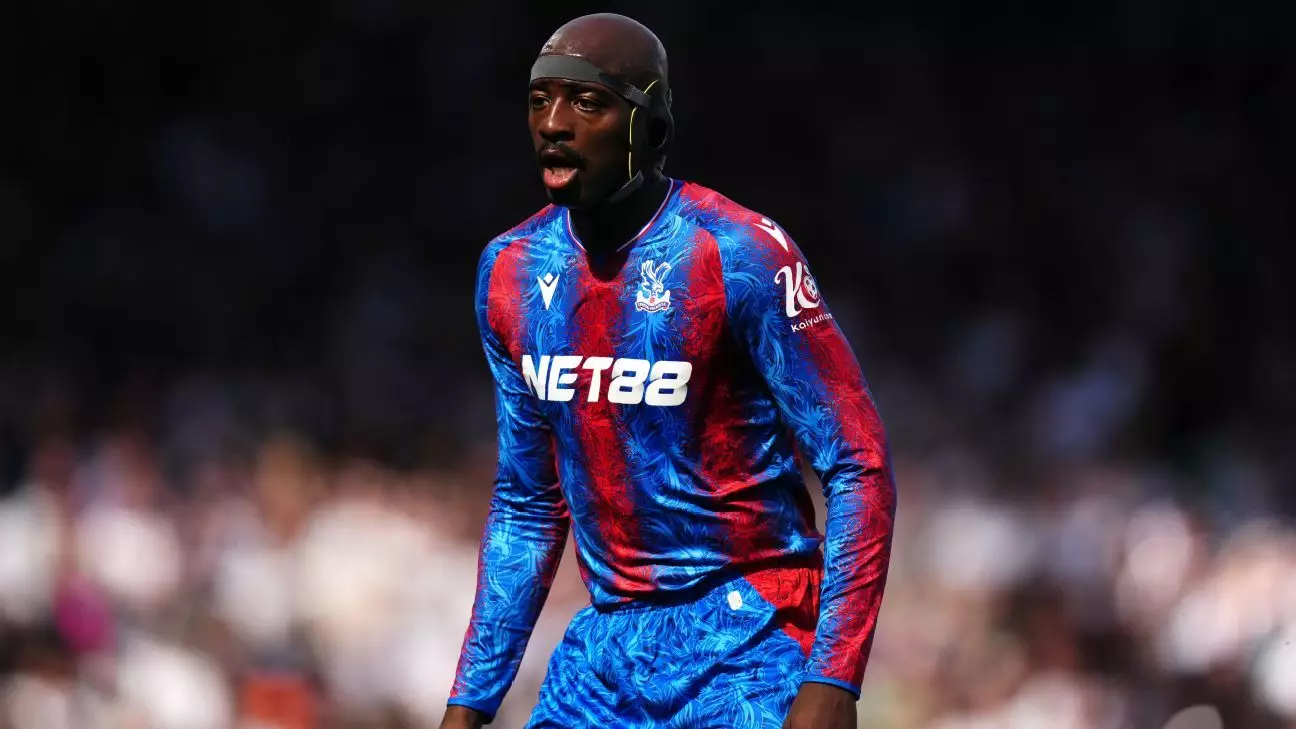Jean-Philippe Mateta’s recent return to the pitch was nothing short of remarkable. Sporting a protective helmet, Mateta made his first appearance since a potentially devastating injury during an FA Cup fifth-round match against Millwall. A violent collision with Millwall’s goalkeeper Liam Roberts left Mateta with a severely lacerated ear, necessitating a daunting 25 stitches and sending him on an unexpected journey through physical trauma and recovery. This event starkly highlights not just the risks athletes face, but also their incredible resilience in the face of adversity.
Mateta’s experience is a stark reminder of the fragility of the human body, especially within the ruthless arena of professional sports. Discussing the incident, he candidly shared his initial fears of more severe injuries—broken bones or even damage to his brain. His instinctual reflex to turn away helped him narrowly avoid what could have been life-altering consequences. “I was lucky because if I hadn’t turned my face, I would have taken his foot right in the head,” Mateta said. Such insight reveals not only the physical dangers of football but the mental fortitude required to face them head-on.
Team Dynamics and Shared Accountability
When Mateta revealed that he remained conscious and eager to return to the game, it underscored an essential aspect of sports culture—the mentality of an athlete. The determination to push through pain and fear signifies more than just a desire to compete; it is about camaraderie and fulfilling roles within a team. As he lay on the ground, pleading with the medical staff to let him continue, it became evident that the love for the game transcended the immediate danger he was in. Mateta’s commitment to his team stands as a testament to the psychological dimensions of professional sports.
Conversely, the incident drew lines of blame that not only communicated the physical repercussions of reckless play but also the latent pressures athletes face. Following the clash, Roberts faced an extended ban and even abusive messages—a stark reminder that the ramifications of such incidents do not only affect the injured party. Mateta’s understanding response to Roberts revealed a level of maturity and compassion. “It was just a mistake. You learn from it,” he remarked, positioning himself not only as a victim but as a fellow athlete who recognizes the shared burden of misfortune that accompanies competitive sports.
The Art of Recovery
Transitioning back onto the field is often fraught with psychological challenges, particularly after traumatic injuries. Mateta’s situation serves as a valuable case study in the broader context of athletic recovery. While his physical healing was guided by professionals, the mental preparation is equally crucial. Manager Oliver Glasner’s comments highlighted Mateta’s capacity for renewed performance despite two weeks out of training. The team made a concerted effort to find the right protective gear—a symbol of the foresight and responsibility necessary to protect the players in an increasingly competitive environment.
Glasner’s confidence in Mateta’s return indicates a burgeoning belief in his player’s ability to not only recover but to maintain his performance level. After scoring 15 times in the current season, Mateta’s on-field statistics suggest he possesses the quality to impact games positively. However, whether he can safely channel his aggression and willingness to get involved in challenges remains an open question, echoing the psychological battles athletes face upon recovery.
Redefining Boundaries of Courage
Mateta’s story is more than just about stitches and protective headgear; it encapsulates the essence of resilience and the drive to overcome challenges, both mental and physical. The evolution of his injury narrative sheds light on the often-unseen struggles athletes undergo as they navigate their recovery paths. In a sport revered for its physicality and intensity, Mateta has become an emblem of courage, showcasing that beyond the tactical and physical skills, it is the psychological resilience and the human spirit that truly define an athlete’s journey.
In an environment filled with competition, the ability to mentally exist on the field after trauma speaks volumes about personal growth and the camaraderie shared among players. Ultimately, as athletes like Mateta return, they offer not just thrilling performances but also poignant reminders of their humanness—elements that make sports relatable, inspirational, and profoundly impactful.

